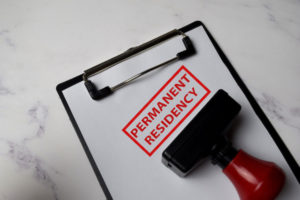What is the pathway to freedom of movement for citizens of African countries? In part one, we made the sad finding that Africans are by far the worst affected by the European visa hurdle. Aside from having the highest rate of Schengen visa refusals, all countries in continental Africa are in the bottom 100 in terms of passport ranking according to the 2020 Henley Passport Index. The only two African countries with a “good passport” are the islands of Mauritius and The Seychelles.
What do we mean by “good passport”?
A “good passport” is one that offers maximum freedom of movement (an objective consideration) and belongs to a country where we would be happy to live in (a more subjective factor). With a good passport, you can travel to most OECD countries with no visa. A good passport also belongs to a country that is safe and politically stable, and that can become a refuge in case of trouble back home. It is an unfortunate fact that most countries in Africa are politically unstable and fare poorly on corruption and crime. Nigeria and Guinea, the two countries with the highest Schengen refusal rate, are also amongst the most unsafe, corrupt and violent countries in the world, according to the Corruption Perception Index, the Global Peace Index and the United Nation Office on Drugs and Crime. A second passport gives the holder a breath of fresh air and frees them from the limitations of their own country.
How to overcome the visa hurdle inflicted by a “bad passport”?
There are fundamentally three options. The first one is to get a residency card from an EU country. The two others consist of acquiring second citizenship to get a “good passport”. Each has pluses and minuses. The purpose of this article is to help Africans make the right choice. There are other more exotic options, but for this article, we will stick to tried and tested mainstream programmes.
All the options analysed below are official programmes that have been launched by governments to attract investment and talents. They are typically called “Citizenship by Investment Programmes” or “Golden Visas Programmes” depending on the location and the nature of the programme. All programmes offer residency or citizenship in return for an investment or a donation, or a combination of both. For each programme, the government approves the applicants. Lawyers and citizenship programme specialists such as Shorex Capital handle the applications and guide the client through the various investment choices. In this article, “donation” will always mean donation in a government fund.
The EU residency card route
A few countries in Europe are offering a permanent residency programme, often called Golden Visa Programmes. An EU permanent residency card allows the holder to travel visa-free in the Schengen zone, which is most of Europe, with the notable exception of the UK. It also allows you to live in the country of issue of the residency card. However, it does not, except for Portugal, give the right to work in that country. Golden visas programmes are cheaper than European citizenship programmes. For that reason, they are ideal for someone who wants an affordable solution to travel visa-free in the EU, for business or pleasure, while at the same time having a second home in Europe. The main limitations are twofold: 1- they do not give the right to live or work in any other EU country; 2- outside the Schengen zone, the residency card is worthless. Portugal, Greece, and Malta offer the main Golden Visa programmes. The programmes are similar and consist of investing in real estate in the country of residence. The minimum investment required is €250,000 in Greece, €300,000 in Malta and €350,000 in Portugal. It takes between three to six months to process an application. You can include your spouse, children and parents. Portugal offers the only Golden Visa programme that leads to citizenship without having to live there. However, it takes six years of holding the Portuguese residency card before being able to apply for a passport. Moreover, one needs to pass a Portuguese language test and demonstrate ties to the country.
To summarise, a Golden visa is excellent to travel visa-free in the Schengen zone. Still, it is not the best choice if you either intend to live in the EU or want an international travel document and second citizenship.
The Caribbean Passport route
Caribbean countries are tiny nations with an economy mostly based on tourism. Owing to historical links with the UK and a small population that never presented an immigration threat, Europe granted nine Caribbean countries visa-free access. St Kitts and Nevis was the first nation to exploit that visa-free advantage by inviting investors from all over the world to take citizenship. In 1984, they launched the first citizenship by investment programme which consisted of making a real estate investment in a government-approved development in return for citizenship. Since its inception, the programme has been upgraded and copied by other Caribbean nations offering similar schemes. Nowadays, Caribbean citizenship programmes typically offer a choice between making an investment in real estate or making a donation to a government fund. Depending on the Caribbean countries, minimum real estate investments vary between $200,000 and $500,000, and donations range from $100,000 to $300,000. Nowadays, five of the Caribbean countries having Schengen visa-free access are offering citizenship by investment programmes: Antigua and Barbuda, Dominica, Grenada, St Kitts and Nevis, St Lucia.
A Caribbean citizenship application takes between three and six months. In addition to your spouse, you can include in the application children and parents, with age restrictions varying from one country to another. The applicant does not need to reside nor visit the country to obtain citizenship. Citizens have visa-free access to the UK, the Schengen zone, Singapore, Hong Kong, Brazil and in some cases, to Russia and Argentina. Though very similar, the list of visa-free travel varies slightly from one Caribbean country to another. In Europe, visa-free travel allows them to visit the UK for business or pleasure for up to six months a year, and Schengen zone countries for up to three months in a six-month period. However, they are not entitled to live, study or work in any European country.
Finally, a convenient agreement among the 15 members of CARICOM – a regional grouping of Caribbean countries – allows any citizen of a member state to reside in any other member state. Considering the beauty of the Caribbean, the excellent climate, the low tax regimes, and the proximity to the US, it opens a whole new world of residency opportunities.
To summarise, a Caribbean passport is great to travel visa-free in the Schengen zone and to the UK. It provides the safety net of second citizenship. But if a member of your family plans to live, study or work in Europe, it is not the right choice.
The European Passport route
Inspired by the success of Caribbean citizenship programmes, some EU member states started to offer similar programmes. Three countries have opened their citizenship to investors without the strict requirement to live in the country. EU citizenship is the gold standard in terms of mobility. With a European passport, not only can you travel visa-free in more than 150 countries, but you and your family can also live, study and work in any EU country without any limitation. As off writing, only Malta and Portugal have a programme that leads to citizenship. The Cyprus programme, which was the best, was terminated at the end of 2020.
From an African perspective, an EU passport is the only sure way to achieve long term mobility and protect the family from potential problems back home. When deciding between Malta and Portugal, it is vital to choose a country that can be one day your primary residence.
There is a new citizenship programme which is worth mentioning: Montenegro. Montenegro is at the heart of Europe but not yet part of the EU. By investing in real estate, a minimum of €250,000 in the north or €450,000 in the south, and making a €100,000 donation, one can obtain citizenship within six months. Montenegro citizens have visa-free access to Schengen zone countries. Montenegro is due to become a full member of the EU by 2025. Therefore, for an investor ready to wait five years, Montenegro can be an affordable way to access EU citizenship while enjoying in the meantime its visa-free facilities and a home in this beautiful small country.
Conclusion
Citizens of African countries have many options to increase their family’s mobility. Golden visa and citizenship by investment programmes allow families of any African country to become either permanent residents or citizens of states that have visa-free access to the European Schengen zone. These programmes enable the applicant to include their spouse, children and parents. With an EU residency card such as the one offered by Greece, one can live in the country of residence and have visa-free access to the Schengen zone, but not the UK. The entry-level for golden visa programmes is €250,000. With a Caribbean citizenship programme such as the one offered by St Kitts and Nevis, one can travel visa-free to mainland Europe and the UK. The entry-level for Caribbean citizenship such as Dominica is $100,000. Finally, for ultimate mobility and freedom, one can become a citizen of an EU country that has a citizenship by investment programme, such as Malta.
The process of going through a citizenship programme is much easier than people think. With a good adviser, it can be an enjoyable experience and open a new chapter in one’s life. To quote one of my clients, Usman from Nigeria, who four years ago acquired citizenship in Cyprus: “Visa applications to travel abroad used to drive my wife and me crazy. We had a good life in Nigeria, but every time I was travelling on business with my European partners, I could see how carefree they could enter any country while I was trapped with the wrong passport. Finally, at the age of 48, after reading an article in Forbes magazine about European citizenship programmes, I decided to bite the bullet. I chose Cyprus because I had visited the place and liked it. We bought a beautiful seaside villa in Paphos and got our citizenship in six months. Since then, our son moved to London and launched a fintech startup and our daughter studies in Paris and intends to find a job in Europe after she finishes her degree. As for my wife and I, we finally started travelling the world without headaches. None of that would have been possible before. I don’t want to sound dramatic, but it’s a new life!”. Usman made the decision on time to take advantage of the opportunity. Unfortunately for others today, the Cyprus programme no longer exists, which demonstrate the importance of acting swiftly.




